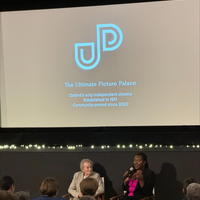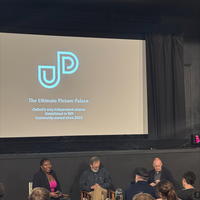On April 1st, a refreshingly sunny Tuesday evening, the Ultimate Picture Palace welcomed Oxford’s film lovers for a special screening of Carol Reed’s The Third Man (1949) as part of the 2025 April Fakes Day celebrations spanning several events across the day (and beyond).

Before the film began, Professor Patricia Kingori (Global Health Ethics, Oxford Population Health), creator of the April Fakes Day series, led a Q&A session with Angela Allen, one of the last living crew members of The Third Man. Angela captivated the audience with stories from the set, but one in particular stood out: the filming of the iconic chase scene in the Viennese sewers. While the movie’s climax unfolds in the labyrinthine sewers of Vienna, the production team faced a major challenge: navigating bulky filming equipment through the underground tunnels. The solution was creative and brilliant, the sewer sequence was actually shot in a single location, cleverly staged to create the illusion of an expansive underground chase.

Then came the film itself. With its sharp dialogue, stunning cinematography, and unforgettable performances, it’s easy to see why The Third Man has cemented its status as a cult classic. Would it pass the Bechdel test? Probably not. But it offered an interesting exploration of friendship, loyalty, and the moral dilemmas that arise in a fractured post-war world.
Following the screening, Professor Kingori was joined by Professor Paul Newton (Nuffield Department of Medicine) and Dr Rodrick Bailey (Faculty of History) for a panel discussion on one of the film’s key material tenet—penicillin. They explored its historical significance, the wartime black market for medicine, and how these real-life events shaped the story of The Third Man.
From hidden filmmaking tricks to the ethical questions of war and survival, the screening was more than just a night at the movies—it was a journey the viewers will not forget anytime soon.